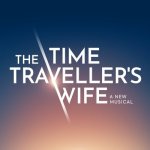
THE TIME TRAVELLER’S WIFE at the Apollo Theatre
★★★

“the show is a feast for the eyes with plenty of jaw-dropping, ‘how-do-they-do-that’ moments”
As a species, the ability to conquer the fourth dimension has always fascinated us. Which is why it is so prevalent in literature and popular culture. Particularly as this year comes to an end with the highly anticipated 60th anniversary of Dr Who on the horizon. It is argued that Sophocles wrote the first time travel story over 2,500 years ago. The popularity of the concept has almost convinced us that time travel could, in fact, be possible. Most fantasies revolve around our ability to control our passage through time – from the past or to the future and back again. Audrey Niffenegger’s novel, “The Time Traveller’s Wife”, turned that around to tell the story of a man who has no control. It is not a gift but a curse, and questions of free will, fatalism or predeterminism give the novel a philosophical sheen. The success of the story, however, stemmed from the fact that it was perceived as a love story.
It is this aspect that informs the new musical, which premiered at Storyhouse, Chester last year before its West End run. Lauren Gunderson’s book, with Dave Stewart and Joss Stone’s music and lyrics, is a sugar-coated treat. More saccharin than the real deal raw stuff, there is a synthetic quality to the way it pulls at our heart strings. But once we get used to it, we allow ourselves to be drawn into the narrative. What undoubtedly helps is Bill Buckhurst’s magnificent staging. A collaborative effort, drawing on the skills of illusionist Chris Fisher, the show is a feast for the eyes with plenty of jaw-dropping, ‘how-do-they-do-that’ moments.
“Despite the captivating themes, the episodic nature of the piece leaves them dangling”
At the heart of the story are Henry and Clare – the time traveller and his wife (David Hunter and Joanna Woodward). Henry is a man with a genetic disorder that causes him to time travel unpredictably while his wife, Clare, is left behind to cope with his frequent absences. It is fitting that Woodward opens the show, introducing herself directly to the audience. After all; it’s in the title. Refreshingly told from the wife’s perspective, Woodward empowers her character in a finely balanced performance, practically stealing the show with the highlight musical number, ‘I’m In Control’. It is a rare moment when the emotional temperature lifts a few degrees. Elsewhere, however, the score laps around us in lukewarm waves of predictability.
The narrative is surprisingly easy to follow, given the complex nature of the storyline. Especially when put on paper. Henry and Clare first meet in the library where Henry works part time. Clare has already met Henry several times throughout her life when Henry was older and travelling back in time to visit her. But because Henry is younger than that now, he hasn’t yet built the memories of this, so he has no idea who Clare is. See what I mean? Henry has unwritten ‘rules’ of time travel that he can’t break. But of course, he does – particularly when it is in order to save his marriage. Woodward and Hunter both give polished performances that clearly pinpoint where, and when, we are in their romance. Fantastic support comes from Tim Mahendran and Hiba Elchikhe, as Gomez and Charisse, their best friends and conventional couple who mirror the ups and downs of matrimony without the added complications. Special mention must be made of Holly-Jade Roberts, who plays the young Clare with a fascinating, quirky and natural assuredness beyond her years.
Despite the captivating themes, the episodic nature of the piece leaves them dangling. Yet we also appreciate that this may be an essential part of it, as normal life is continually being torn apart by these uncontrolled fissures in time. And the numerous scene transitions are almost another character in itself. But the questions never dig too deep, hindered as they are by lyrical platitudes such as ‘time is nothing’. Perhaps there is too much to explore and, despite running at just over two and a half hours, there isn’t the time. We leave with a sense of being slightly underwhelmed, but thoroughly entertained, nonetheless. The question remains; will it stand the test of time? Well, there’s only one answer. Only time will tell.
THE TIME TRAVELLER’S WIFE at the Apollo Theatre
Reviewed on 2nd November 2023
by Jonathan Evans
Photography by Johan Persson
Previously reviewed at this venue:
Potted Panto | ★★★★★ | December 2022
Cruise | ★★★★★ | August 2022
The Time Traveller’s Wife
The Time Traveller’s Wife
Click here to read all our latest reviews







